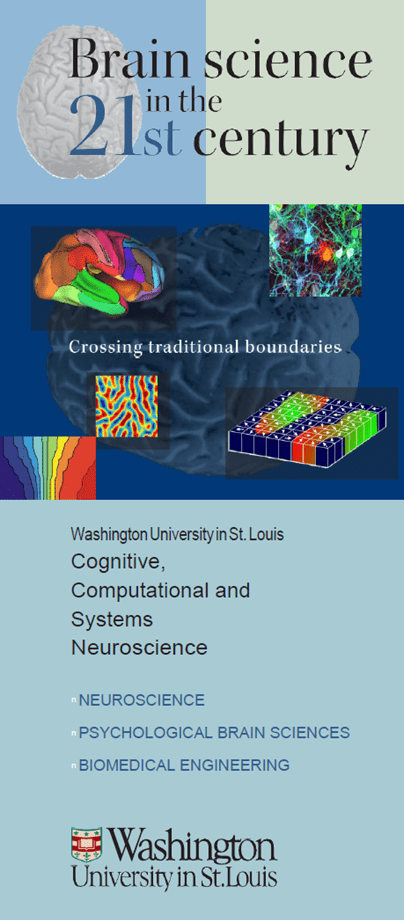
The Cognitive, Computational and Systems Neuroscience Pathway (CCSN) has existed in various forms for >15 years and has a demonstrated history of remarkable success. At the same time, the scope of the pathway has evolved somewhat over time. Several components of the pathway were recently revamped or re-designed to be maximally responsive to the current needs of students.
The CCSN is a specialized curriculum available to students pursuing a PhD in Neuroscience, Psychological and Brain Sciences, Biomedical Engineering, or other brain-related discipline at Washington University (including students in the Medical Scientist Training Program). The CCSN Pathway is not a separate degree-granting program, and CCSN students must fulfill all of the degree requirements of their home programs.
The CCSN Pathway provides an integrated curriculum that is compatible with course-scheduling constraints in the home degree-granting programs. The curriculum is challenging and is designed to help students tackle problems using an interdisciplinary approach.
The CCSN Pathway develops in two phases. In Phase 1 (years 1-2), students take 3 pre-requisite courses (at least one of which fulfills a requirement in the home PhD program). Through these courses, students obtain the requisite background and foundation in each of the three components of the pathway (Behavior/Cognition, Systems Neuroscience, Neural Computation).
In Phase 2 (years 3-4), CCSN students receive extended trans-disciplinary training, through two custom-designed courses that develop their quantitative fluency and knowledge of cutting-edge data science approaches, which culminates in the development of a trans-disciplinary research project. In addition, they enhance their scientific skills through a series of career development activities, including mentoring junior CCSN students, organizing and participating in immersive encounters with external speakers, presenting at a CCSN seminar series, and taking part in informal dinners with CCSN faculty. Through these activities, CCSN students acquire leadership skills, build relationships within the community, and network with experts in the field.
Throughout the Pathway, CCSN students participate to community outreach activities promoted by the St. Louis Neuroscience Outreach Program.